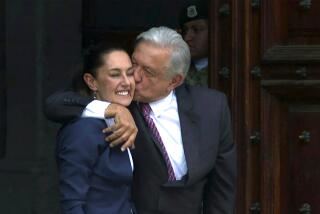Nicaraguan Opposition Unveils Plan for Ruling
- Share via
MANAGUA, Nicaragua — This country’s political opposition, launching its six-month electoral campaign, unveiled Saturday a plan of government that would scale down Nicaragua’s army and the revolutionary state built during a decade of Sandinista rule and give freer rein to private enterprise.
Leaders of the Nicaraguan Opposition Union said the platform adopted by consensus after three days of meetings is the first to be shared here by such a range of ideological interests. The 14-party bloc, known as UNO, spans the spectrum from Communists to conservatives.
“This is a winning program,” said Roberto Urroz, a former Contra official who returned from exile last spring and presided over the platform debate. “It is a document of conciliation, a basis for rebuilding Nicaragua.”
The debate, which also involved businessmen and anti-Sandinista labor leaders, was a warm-up for the choice of a candidate to challenge President Daniel Ortega in the Feb. 25 election.
Opposition leaders said they concentrated first on the platform to strengthen their fragile two-month-old alliance for the potentially more bruising nominating session, which starts Tuesday. Leading candidates are opposition publisher Violeta Barrios de Chamorro, business leader Enrique Bolanos Geyer and Independent Liberal Party leader Virgilio Godoy Reyes.
The platform, calling for a coalition “government of national salvation,” was signed by 14 party leaders and endorsed by each of the presidential candidates in separate interviews or statements.
It proposes to rebuild Nicaragua’s war-shattered economy by restoring the confidence of private businessmen and inducing peasants to expand agricultural output. Financing would come from a “drastic reduction” of military spending and of “bureaucratic costs” and would be sought from foreign investors and such international lenders as the World Bank.
To establish business confidence, leftist parties in UNO accepted a number of demands by private sector leaders. They included abolishing all wage and price controls, ending the state monopoly over banking and foreign trade, and eliminating “the dictatorial method of economic planning by the state.” UNO would also abolish the Sandinista practice of confiscating private property.
“We have to recognize that it’s the businessmen who have to pull the country out of its crisis,” said Alfredo Cesar, another former Contra who leads the Social Democratic Party.
Conservatives in the coalition agreed to accept, with modifications, such Sandinista programs as agrarian reform, universal education and health care. The platform would guarantee workers “a minimum wage that corresponds to the cost of living” and the right to share in the management and profits of their companies.
Even before it was signed, Sandinista commentators attacked the platform as the work of “reactionaries” seeking a regime like the dictatorship of Anastasio Somoza, ousted in the Sandinista guerrilla takeover of July, 1979.
“The result (of UNO’s platform debate),” wrote Carlos Fernando Chamorro in the Sandinista newspaper Barricada, “is rice with mangoes--conservative precepts adorned with the exotic language of concepts like social progress.”
Under voting rules that took effect Friday, opposition parties are given 30 minutes of prime time on state-controlled TV each evening to respond to such attacks. Speaking for UNO on the first telecast, Urroz said its platform “rejects the extremes of left and right.”
Sandinista officials said their formal campaign will be launched in early September with the announcement of candidates. Ortega, elected in 1984 against a weaker, more divided opposition, has been chosen to run again.
Already, however, officials of the ruling party have been telling peasants that an anti-Sandinista government would take away their land and try to neutralize the army as a means for defending popular interests.
UNO’s platform says that any landowner dispossessed under the Sandinista agrarian reform may recover his farm or be compensated for it only if the courts rule that the takeover violated the Sandinistas’ own restrictions on ownership. The rights of peasants now working such land would not be taken away.
Moving to accelerate the Sandinista policy of putting some state farms in private hands, the opposition would convert all land-use titles now held by thousands of peasants into land ownership titles. In addition, peasants who lost their land in war-related evictions could return to them.
UNO called for abolishing compulsory military service.
More to Read
Sign up for Essential California
The most important California stories and recommendations in your inbox every morning.
You may occasionally receive promotional content from the Los Angeles Times.













